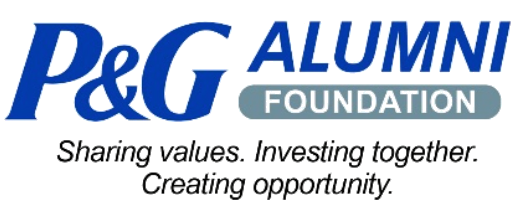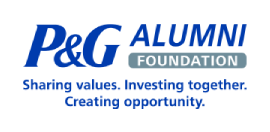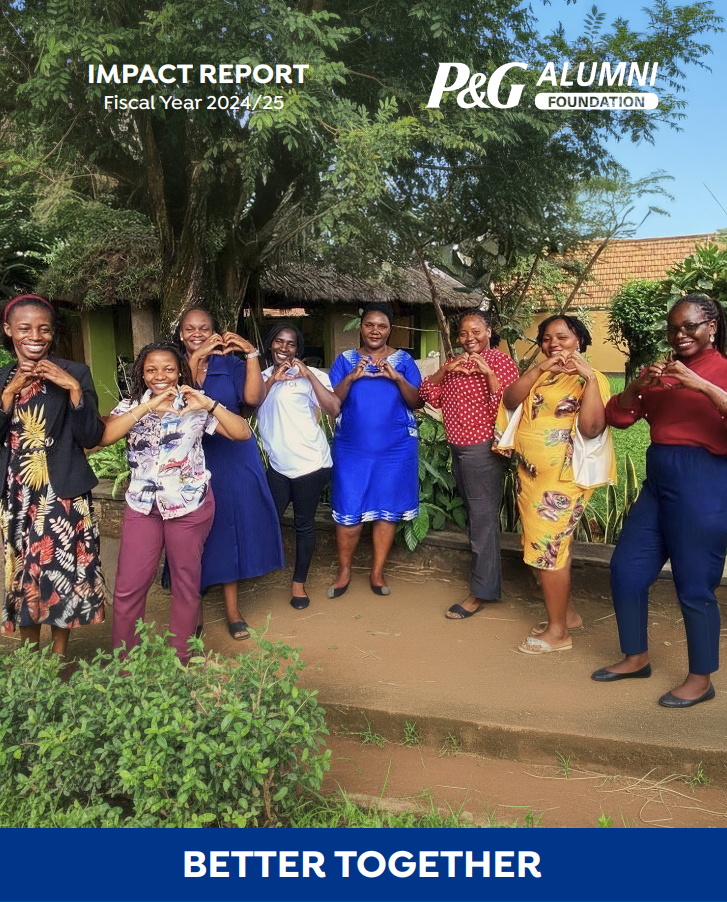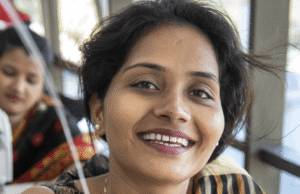




Our Mission/Purpose
With the sense of gratitude for the skills learned and friends made at P&G, we harness the power of the global P&G Network to give charitably and apply our expertise to help people in need economically thrive.
As the philanthropic arm of the P&G Alumni Network, we multiply the efforts of P&G alumns providing people in need economic paths to prosperity. Through strategic grant making to charitable organizations with active P&G alumni involvement, we empower people around the globe to build bright, sustainable futures through job, vocational training, and new business start-ups.
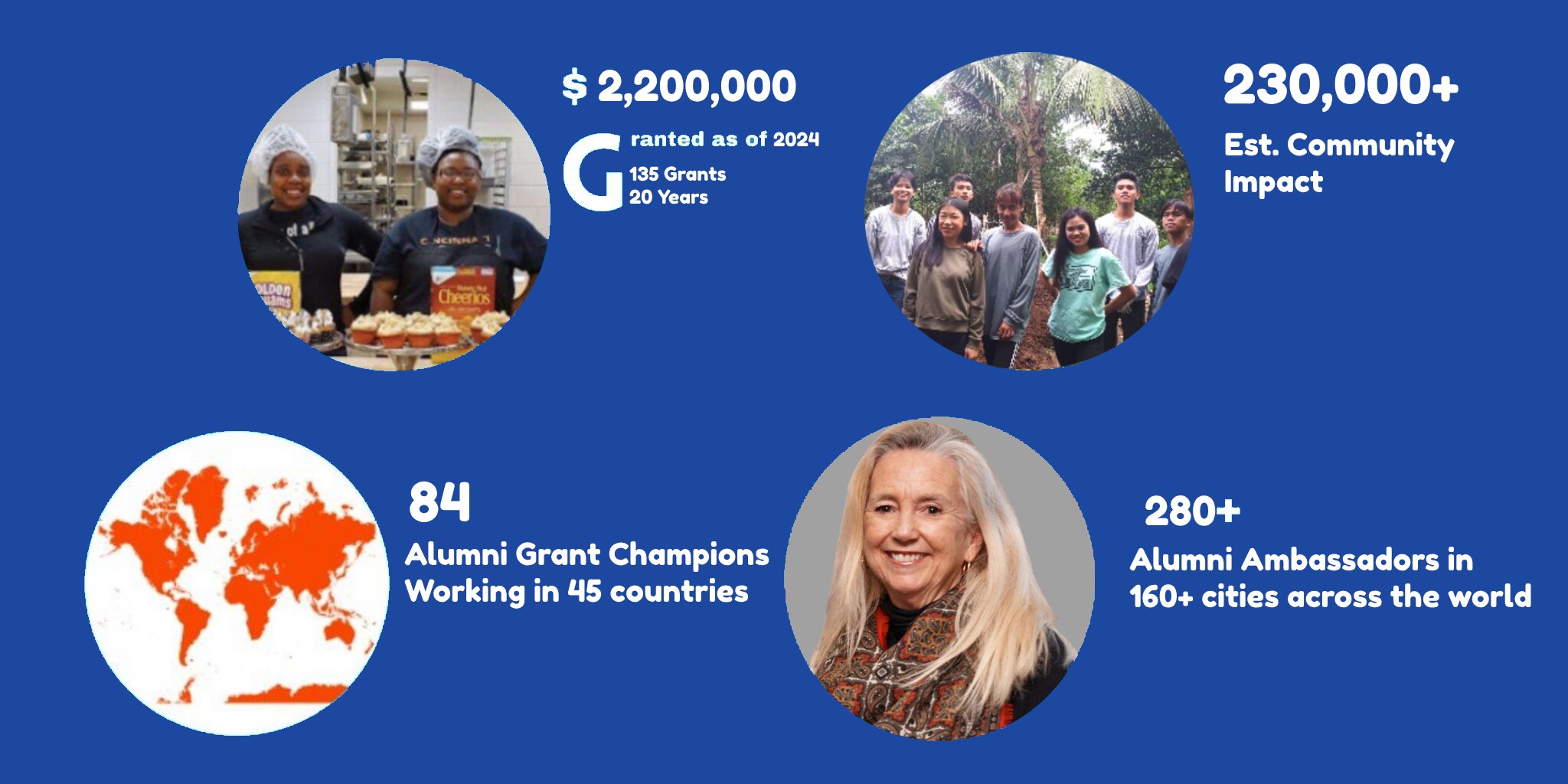
IMPORTANT HAPPENINGS
ANNOUNCING the first recipient of the Francie Garber Pepper Grant for Women’s Empowerment – Aruna Project
P&G Alumni Foundation partners with charitable organizations
that are meaningfully and actively supported by P&G Alumni.
DONATE

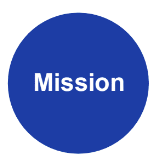 Abiding Hope Haitian Timoun Foundation
Abiding Hope Haitian Timoun FoundationThe Mission of the Haitian Timoun Foundation (HTF) is to create generational change that transforms lives. Its vision is for a Haiti where ALL are valued and thrive.

Julie Skare
31 years in R&D in Cincinnati, OH.
Julie has been involved with HTF for over 9 years, organizing fundraising events in Loveland, OH as well as, since 2021, San Jose, CA. She is a member of the HTF Community Council, a group of congregation leaders across the US who meet virtually to exchange ideas on how to best support HTF in respective local communities.
In support of the proposed project, Julie writes, ‘The Chemen Lavi Mayo (CLM) project is important to me because ultra poverty in Haiti is an issue that affects millions of women and their children. Characterized by severe deprivation of basic human needs and earning less and $1.25/day, the ultra-poor are those at the bottom of Haiti’s socioeconomic ladder. CLM has demonstrated success in helping Haiti’s poorest women and their families to gain self-sufficiency.”
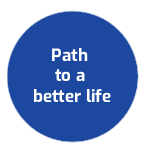
Chemen Lavi Miyo, translated as ‘Path to a Better Life,’ is an 18-month program that empowers women to lift themselves from ultra-poverty. The program features one-on-one enterprise and life skills training offered during weekly home visits from specially trained case managers. These visits help the member gain confidence and develop the skills necessary to build livelihoods to create a better life for themselves and their families. CLM provides each member with the productive assets – such as livestock or a commerce inventory needed to start two income-generating activities. CLM members also receive the materials to construct a home with a sturdy roof, a stable floor, a latrine and a water filter. Each member also receives a small cash stipend while her fledgling business grows and free healthcare in partnership with Zanmi Lasante, Partners in Health’s Haitian sister organization. The program has a 95% graduation rate.
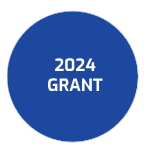
Our $15,000 grant will support a program cohort of 150 women in Mirbelais and Lascahobas, and help fund costs for a stable one-room home, livestock (chickens, goats or pigs) or assets to begin small commerce, a weekly stipend, and a caseworker that meets weekly to help navigate challenges and meet participant goals.
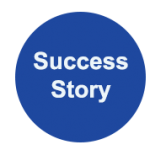
 Yvrose graduated from the CLM program at the end of January. In December, when she was evaluated for graduation, she had accumulated 82,000 gourds (US$630) in wealth. That is a lot for a woman who had reported having nothing 18 months earlier. When she joined the program, she, her husband Jean Gaby, and their three kids had been living in the kitchen of a church that was built on her family's land. Seeing her situation, the pastor eventually threw up a shack for the family, built from old roofing tin and wooden planks that no one wanted. During the program, the CLM team tested a new training workshop for her group, and Yvrose was excited to participate. She learned to make different snack foods from plantains, peanuts, and coconut and package them for sale. It is a way to make higher-mark-up items out of commonly available ingredients, and it can be more profitable than mere trading. By then, Yvrose had built her business capital up to 30,000 gourds ($227) and she put all that money into her new snack business. Her products are popular and the business is growing. She wants to add another room to her house to give her children more space, and she wants to build up her assets through investments in livestock so that she can buy more land. Yvrose is confident and has gained new skills to help sustain her family and provide a better future.
Yvrose graduated from the CLM program at the end of January. In December, when she was evaluated for graduation, she had accumulated 82,000 gourds (US$630) in wealth. That is a lot for a woman who had reported having nothing 18 months earlier. When she joined the program, she, her husband Jean Gaby, and their three kids had been living in the kitchen of a church that was built on her family's land. Seeing her situation, the pastor eventually threw up a shack for the family, built from old roofing tin and wooden planks that no one wanted. During the program, the CLM team tested a new training workshop for her group, and Yvrose was excited to participate. She learned to make different snack foods from plantains, peanuts, and coconut and package them for sale. It is a way to make higher-mark-up items out of commonly available ingredients, and it can be more profitable than mere trading. By then, Yvrose had built her business capital up to 30,000 gourds ($227) and she put all that money into her new snack business. Her products are popular and the business is growing. She wants to add another room to her house to give her children more space, and she wants to build up her assets through investments in livestock so that she can buy more land. Yvrose is confident and has gained new skills to help sustain her family and provide a better future.
 Aruna Project
Aruna ProjectAruna’s mission is to create lifelong freedom for victims and survivors of sex trafficking through employment that’s supported by holistic care. They do this by combining the best of the business and non-profit worlds: making, marketing and selling premium athleisure bags and accessories.

Maddie Bell
11 years at P&G in Brand Management; Cincinnati, OH and Fayetteville, AR.
Other involved Alums (4): Tom Rockwood, Steve Simpson, Dan Price, Kathleen Glover.Maddie joins a cadre of P&G Alum involved in the leadership and management of Aruna. She has served on the Aruna Project Board since 2018 and is directing the brand management and on-line strategies. These strategies have helped increase sales of the goods made by the Mumbai-based and formerly trafficked women production workers. She joins prior sponsor Tom Rockwood as well as Steve Simpson, Dan Price and Kathleen Grover who were former Board members or are significant fund raisers for the organization.
In her letter of support, Maddie describes how Aruna’s practical approach provides sustainable employment coupled with holistic care to victims of sex trafficking; “I’ve seen the extremely well-thought out and comprehensive Aruna model that recognizes the holistic and complex nature of sex-trafficking. I’ve seen solution-based strategies that are making a difference in the lives of hundreds of women. The primary impact most compelling is an 85% sustained freedom rate, meaning 85% of freed women who have come through the Aruna freedom pathway remain free and are no longer at risk of re-trafficking.”
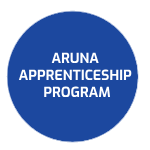
 For young women freed from sex trafficking, Aruna offers a position in the Aruna Apprenticeship Program. The Aruna Apprenticeship Program is a paid 9-12 month program providing transitional housing, trauma counseling, life skill education, and skill & trade development in soft goods manufacturing leading to full time employment in Aruna’s Freedom Business. The primary purpose is to ensure lifelong freedom by equipping and empowering survivors with the personal tools to self-regulate trauma stimuli as well as thrive in a soft goods manufacturing employment opportunity (namely Aruna's Freedom Business).
For young women freed from sex trafficking, Aruna offers a position in the Aruna Apprenticeship Program. The Aruna Apprenticeship Program is a paid 9-12 month program providing transitional housing, trauma counseling, life skill education, and skill & trade development in soft goods manufacturing leading to full time employment in Aruna’s Freedom Business. The primary purpose is to ensure lifelong freedom by equipping and empowering survivors with the personal tools to self-regulate trauma stimuli as well as thrive in a soft goods manufacturing employment opportunity (namely Aruna's Freedom Business).The Apprenticeship Program will further develop business partnerships in industries outside of soft goods manufacturing that are seeking entry level employees. It matches survivors with specific industries of interest to accelerate the number of women sustainably freed. The primary purpose of Phase 2 is to prove the scalability of the Aruna model and ensure innumerable young women experience lifelong freedom through employment supported by holistic care.

The $25,000 PGAF grant will help expand the Apprenticeship program and pay for the critical needs of 25 recently freed women including costs for transitional housing, life skill training, trauma counseling and skills development in soft goods manufacturing. Funds will also be used for additional counselors, tailoring trainers, new sewing machines for this enlarged pool of beneficiaries and fund staff to develop new corporate partners outside the soft good manufacturing arena. 32 new jobs will be created as a result of this spending. An additional 165 women will enter the expanded program via the Outreach Centers, all of which will help impact more than 500 family/community members.

Saachi was forced into marriage at 13, became a teenage mother, and later sought work in Mumbai to support her daughter. Deceived and trapped in a life she never chose, she lost hope until she met Ranjana from the Aruna team. Though fearful of change, Saachi slowly built trust and, with support, found freedom through the Aruna Apprenticeship Program. There, she received housing, life skills training, trauma counseling, and trade development in soft goods manufacturing. Excelling in the program, she secured a stable job and now provides for her daughter’s education while helping other women find freedom. “I find satisfaction in my work because I’m paving the way for others on this journey.”

 Associazone Centro ELIS (ELIS Center Association)
Associazone Centro ELIS (ELIS Center Association)ELIS aims to fight educational poverty by supporting young people in discovering their professional vocation and placing them in the labor market to promote local entrepreneurship and the social and economic emancipation of women.

Virginia Filippi
12 years in Consumer Relations and Sales/CBD, Italy.
Other involved Alums (2): Patrizia Gabellini and Luigi De Costanzo.Virginia is now Chairperson of the Board of CEDAL (Cooperativa Sociale Educativa ELIS), an affiliated program within the ELIS organization that provides vocational training among other social benefits. In the past 7 years she has led a major expansion of the organization, growing its employee base from 110 to over 500, 49% of whom are women.
In her letter of endorsement, Virginia says: “I joined this organization because I strongly believe in its mission and purpose and with the intent of giving back what I learnt in my 12 years at P&G.”
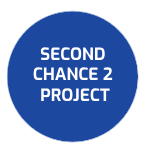
 The project aims to help reduce juvenile delinquency and the likelihood of repeat offenses among young adults who have been in trouble with the law, focusing particularly on the Lazio Region and the metropolitan area of Rome. Second Chance 2 is the extension of the Second Chance project which resulted in 21 young adults trained and offered the opportunity to enter the job market through an internship. Results to date indicate a near 100% reduction in recidivism rates. This 2nd phase will facilitate the socioeconomic reintegration of an additional 15 young adults entangled in legal issues. Participants will obtain the professional qualification certificate for ‘installer and maintainer of industrial electrical systems’ and will be trained in life skills. This dual & integrated model with peer-to-peer education & life coaching combined with the technical professional training trajectory is aligned with market demands. Program will be run in collaboration with relevant juvenile justice authorities.
The project aims to help reduce juvenile delinquency and the likelihood of repeat offenses among young adults who have been in trouble with the law, focusing particularly on the Lazio Region and the metropolitan area of Rome. Second Chance 2 is the extension of the Second Chance project which resulted in 21 young adults trained and offered the opportunity to enter the job market through an internship. Results to date indicate a near 100% reduction in recidivism rates. This 2nd phase will facilitate the socioeconomic reintegration of an additional 15 young adults entangled in legal issues. Participants will obtain the professional qualification certificate for ‘installer and maintainer of industrial electrical systems’ and will be trained in life skills. This dual & integrated model with peer-to-peer education & life coaching combined with the technical professional training trajectory is aligned with market demands. Program will be run in collaboration with relevant juvenile justice authorities.
The 2024 PGAF Grant of $25,000 will be used across all phases of this 12 month program including: Screening of potential candidates, staff salaries, tutoring, training equipment & rooms and support for job recruitment.

Luigi stands at a pivotal moment, transitioning from a past marred by mistakes to a present where his sense of responsibility toward his family is steadily growing. Having faced the challenges of growing up too soon and making poor choices, he found an opportunity for a fresh start at ELIS, where he established new goals for himself. While aware of his imperfections, Luigi has chosen to "run" toward a better future for himself and his children. His deepest motivation is to provide them with a peaceful and united family life. Simple gestures, such as picking up his daughter’s teddy bear, symbolize his commitment to offering the love he lacked as a child. For Luigi, true fulfillment lies in waking up each day knowing he has built a joyful and stable life alongside his loved ones.

 Chamos – In the Aid of Children of Venezuela
Chamos – In the Aid of Children of VenezuelaChamos’ mission is to enhance the well-being of underprivileged children and young people in Venezuela, equipping them with essential education, tools, and resources for a prosperous future with dignity and expanded opportunities.

Alejandro O’Daly
16 Years in Finance and Executive Management; Chile, Panama, Venezuela.
Alejandro has been involved with Chamos since 2019, raising awareness of Chamos within his professional and personal circles and growing its donor base. During the pandemic, Alejandro facilitated a crucial partnership with his company that bolstered Chamos’ WASH (water, sanitation and hygiene) program and delivering 329 boxes of soap that reached an estimated 23,600 of Venezuela’s most vulnerable families. It also resulted in significant multi-year commitments from major corporate partners in the sector - including P&G - to support the continuation of their WASH work.
Alejandro writes in his letter of recommendation, “I left P&G with a strong sense of social responsibility, and upon returning to my home country of Venezuela after several years abroad, I seized the opportunity to give back. Chamos deeply resonates with me due to its mission and operational discipline, echoing the ethos I developed at P&G.” In promoting the project in particular, he writes: “I am particularly excited about the Chamos Academy, which has shown remarkable progress over the last year. The evolution of the Academy highlights to me the capability of Chamos to create real change for young people who otherwise face significant barriers, and the sustainability and scalability of its work.”
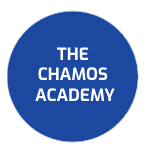
 The primary purpose of the Chamos Academy is to enhance digital literacy among young people in Venezuela, specifically targeting the disadvantaged aged 15-18 years. The program establishes computer labs in under-resourced schools and runs coding and digital skills workshops, equipping these individuals with essential IT skills and preparing them for higher education, vocational training, and careers within and beyond STEM fields. Beyond technical skills, the Academy focuses on developing interpersonal skills through collaborative projects, feedback, presentations and problem-solving challenges. Lastly, the Academy is dedicated to helping students prepare for the job market, ensuring they are capable of contributing effectively to their future roles and navigating the professional world. Teachers will actively engage in mentoring students on resume writing, interview preparation, and networking strategies, providing them with the tools and confidence to secure internships and employment opportunities. This holistic approach aims to build confidence and foster a sense of value and potential.
The primary purpose of the Chamos Academy is to enhance digital literacy among young people in Venezuela, specifically targeting the disadvantaged aged 15-18 years. The program establishes computer labs in under-resourced schools and runs coding and digital skills workshops, equipping these individuals with essential IT skills and preparing them for higher education, vocational training, and careers within and beyond STEM fields. Beyond technical skills, the Academy focuses on developing interpersonal skills through collaborative projects, feedback, presentations and problem-solving challenges. Lastly, the Academy is dedicated to helping students prepare for the job market, ensuring they are capable of contributing effectively to their future roles and navigating the professional world. Teachers will actively engage in mentoring students on resume writing, interview preparation, and networking strategies, providing them with the tools and confidence to secure internships and employment opportunities. This holistic approach aims to build confidence and foster a sense of value and potential.
The $25,000 PGAF award will help maintain operations at Chamos’ three current school locations, upgrade educational infrastructure and offerings, and improve students' employment outcomes. Funds will contribute towards the purchase of 54 new laptops equipped with the latest cybersecurity software and Microsoft Office licenses, enhance the teaching staff and curriculum by financing the stipends of five lead teachers and an additional instructor, and help support essential operational roles including the Program Manager in Venezuela. This initiative is expected to benefit approximately 84 students in the 2024-25 academic year, expanding to include 99 students by 2025-26.

Keiner's story is about a young boy from Venezuela who has significant challenges in receiving education due to the country's economic crisis. His story reflects the harsh reality of many Venezuelan children who are forced to drop out of school to help their families survive. Thanks to Chamos, Keiner received a scholarship that has allowed him to continue his education. Listen to Keiner himself. Keiner's Story

 Cincinnati Youth Collaborative
Cincinnati Youth CollaborativeThe mission of Cincinnati Youth Collaborative is to empower young people to overcome barriers and excel in education, career and life.

John Pepper, Retired CEO of P&G
40 years in Executive Management and General Management in NA & Global.
Cincinnati Youth Collaborative (CYC) was founded in 1987 by John Pepper who has been materially involved in various capacities during the history of the organization. Mr. Pepper previously served on CYC’s Executive Board and is currently an Advisory Board Member. He and his wife, Francie, have also been consistent and generous financial supporters. It was Mr. and Mrs. Pepper who, in response to rapidly escalating high-school dropout rates, brought community leaders together with the Cincinnati Public Schools superintendent Ray Brokamp and the Vice Mayor Ken Blackwell to engage the community in an effort to help vulnerable youth get a jumpstart on their future and bypass the barriers to education that they faced. Since that time, Mr. Pepper has continued to drive the mission of CYC forward and has compelled numerous leaders in business, education, religion, and city government to give their continued support to this effort.
‘Over 36 years ago, I helped found the CYC in response to the exceedingly high rate of public high school dropouts. Since its inception, the CYC has empowered over 180,000 young people to boost their academic performance while preparing for entering prosperous careers. There’s no excuse for allowing a young child’s future to be so largely predicted by the zip code in which they happen to be born. I have found the CYC’s young people to be truly unstoppable with a modicum of support.’
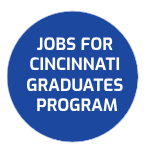
 The JCP serves students from the Cincinnati Public Schools (CPS) System and is dedicated to preventing dropouts among students in grades 7-9 who have serious barriers to graduation and employment. Young people from this area face intense barriers to personal, academic and professional success. The Ohio Dept. of Education (2022) indicates that 82% of CPS youth are impoverished; graduation rate was 80.8% vs. 85% nationally.
The JCP serves students from the Cincinnati Public Schools (CPS) System and is dedicated to preventing dropouts among students in grades 7-9 who have serious barriers to graduation and employment. Young people from this area face intense barriers to personal, academic and professional success. The Ohio Dept. of Education (2022) indicates that 82% of CPS youth are impoverished; graduation rate was 80.8% vs. 85% nationally.The Child & Adolescent Health Measurement Initiative (2023) indicates that 33% of Cincinnati youth suffer from 2 or more traumatic experiences (homelessness, abuse or incarceration of a parent) vs. 22% nationally. About 84% of program participants are African American, 61% female and about 85% are considered low-income. Mentoring students during Middle School is proven to make an important impact that continues to grow through High School. Students are taught 37 core competencies (including resume writing, time management, communication, team leadership and personal accountability) to lead them in career exploration and career pathway development through classroom facilitation, project-based learning and work experiences.

The PGAF grant of $20,000 will be used to support the Jobs for Cincinnati Graduates Program including curriculum purchase, staff salaries, food & supplies during training sessions and professional attire for students who cannot afford it. It will help fill a portion of anticipated funding gaps for the JCG Program affecting 210 students during the upcoming 2024-2025 academic year and play an integral role in enabling the JCG Program to continue its legacy of helping young people prepare for their careers and succeed academically.

Anya is a student at Aiken New Tech High School who recently participated in the JCG Middle School Program. The reason she enrolled in the program was to build her experience in a working environment and build her future for success. To her, one of the most valuable concepts she learned was how to read check stubs so she understands how her taxes are being withheld and where they are going. Additionally, she learned valuable interview techniques on what to do and what not to do as an interviewee; for example, she learned that making eye contact was important while fidgeting was unadvisable. Finally, she learned how to make effective introductions using the acronym GNAP (Greetings, Name, Affiliation, Purpose). In Anya’s own words, “My summer internship helped me to understand that certain decisions that you make can change her life forever.”

 City Gospel Mission
City Gospel MissionThe Mission of City Gospel Mission (CGM) is breaking the cycle of poverty and despair…one life at a time.

Barry Baker
Product Supply in Jackson, TN & Cincinnati, OH USA.
Other involved Alums (16 identified by name in proposal): In 2023, over 30 P&G staff and alumni volunteered their time including Zeke Swift, Brad Trucksis, Chris Heiert, Burr Robinson, Barron Withspoon, Rodney Swope, Kelly Wilson, John Albrittin, Steven Dryer, Dale Ann Watson, William Reeves, Mark Collar, Ken Metzger, Kirk Perry, Bob Byrns and Michael DeBrosse.
Barry has been with CGM for 19 years and is currently its Executive VP and Chief Administrative Officer. Among other roles, Barry has led and scaled a wide range of programs to expand their reach and further the organization’s mission to break the cycle of generational poverty and despair.
In his letter of recommendation, Barry writes: ‘For the last 19 years, it has been a blessing for me to serve as the Vice President of City Gospel Mission. I have witnessed the non-profit serve over 10,000 men, women and children each year through a variety of adult and youth programs. I walked alongside Zach, who first came to us through our homeless shelter with an addiction to cocaine. After making progress and phasing up through different steps of our programs, including the JobsPlus Program, Zach is now 18 months sober and has a full time career.”
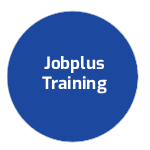
 JobsPlus was founded in 1994 by P&G Alum Burr Robinson and has a 30 year track record of working to break the cycle of poverty through job training and securing employment; to date over 6,000 men & women have been placed in sustainable employment. The JobsPlus Expansion will add 2 new locations in the Avondale neighborhood of Cincinnati to increase the number of people served by 115 for a total of 1,350.
JobsPlus was founded in 1994 by P&G Alum Burr Robinson and has a 30 year track record of working to break the cycle of poverty through job training and securing employment; to date over 6,000 men & women have been placed in sustainable employment. The JobsPlus Expansion will add 2 new locations in the Avondale neighborhood of Cincinnati to increase the number of people served by 115 for a total of 1,350.
The $20,000 PGAF Grant will be used to support the JobsPlus expansion with curriculum and supplies, volunteer training, staffing and more. These funds will help low-income residents prepare for the workforce, find jobs and develop the skills and support systems to maintain their careers long-term.

Two years ago, I lost my wife of 30 years, my high school sweetheart. Her passing sent me deeper into drug use, and I lost everything—my home, freedom, and dignity. After a year of homelessness, rehab led me to JobsPlus, a life-changing decision.
JobsPlus helped me find employment. Carol, a staff member, guided me through the application process and supported me in interviews. I got the job, earned raises, and now train others. But JobsPlus is more than a job program—it’s a support system. My mentor, Mark, and his wife even helped me get my license and a car.Feeling alone is overwhelming, but having support makes all the difference. Thanks to JobsPlus and City Gospel Mission, I got a second chance—and they’ve been with me every step of the way.

 Hope Worldwide
Hope WorldwideThe mission of Hope Worldwide (HWW) is to empower people to overcome poverty, homelessness and addiction through compassionate service.

David Kaner
17 years with P&G, Manufacturing, Product Supply and Purchasing in UK and EMEA.
David has been involved with Hope Worldwide UK since 1995 when it started operations. He served as Chair of Trustees until 2020 and then left the Board in 2021. He is still involved as a volunteer and a member of various Advisory Groups. During his time on the Board the charity’s income grew from $280,000 to $1,550,000. The number of beneficiaries helped has grown even more. Its Two Step program in London has now housed more than 7,500 people since it started.
In his letter of recommendation David writes: “HOPE Worldwide seeks to help people to change their lives; it is not just aid. We focus on people who want to help themselves. One example is Binita who, after completing her training program, was able to get a job as a data entry officer at the Chhaimale Finance Cooperative, doubling her income. The Sewing Dreams program builds on the work already being done in Chhaimale and will help participants make a difference both in family and community.”

 The Sewing Dreams program will provide free vocational training to 40 marginalized women from impoverished families in Chhaimale, Nepal through tailoring and business skills training. Participants will be able to use these skills to set up tailoring businesses in the area, where there are currently no tailoring services available or to get jobs in sewing factories in Kathmandu. The program will consist of 2 cohorts of 20 women each who will attend a tailoring and business training course over a period of six months. Support for business start-up and to obtain sewing machines and materials is included. A full year after completion, HWW expects that 25 of the 40 participants will be employed in the tailoring business.
The Sewing Dreams program will provide free vocational training to 40 marginalized women from impoverished families in Chhaimale, Nepal through tailoring and business skills training. Participants will be able to use these skills to set up tailoring businesses in the area, where there are currently no tailoring services available or to get jobs in sewing factories in Kathmandu. The program will consist of 2 cohorts of 20 women each who will attend a tailoring and business training course over a period of six months. Support for business start-up and to obtain sewing machines and materials is included. A full year after completion, HWW expects that 25 of the 40 participants will be employed in the tailoring business.
The $17,000 PGAF Grant funds will be used to provide 10 sewing machines in the Community Center already established by HOPE WW In Nepal, to set up an equipment and materials loan scheme to support the establishment of new businesses, staffing for program plus six months support for trainees after program conclusion.

Suman, a determined 10-year-old in Grade 4, loves basketball and shares a close bond with his mother, Tej Kumari. They have faced immense challenges, including physical abuse from Suman’s alcoholic father, leading to his mother’s recent divorce.
To survive, Tej Kumari sells vegetables on the street, earning just $3 a day, often struggling to afford a meal. Despite this, she is determined to create a better future. HOPE worldwide Nepal provides Suman with free education and is training his mother in tailoring through a women’s empowerment program. With hard work, she has acquired a second-hand sewing machine and started selling kurtas. She dreams of starting her own tailoring business, and we are confident she will achieve it, securing a brighter future for herself and Suman.

 Just Earth
Just EarthJust Earth (JE) partners with local churches and small-holder farmers to bring transformation to communities in rural Africa and beyond. Just Earth's main focus is to benefit small holding farmers in rural villages in Kenya, improve their farming methods and help them set up small businesses, thereby helping alleviate poverty in their communities and provide a sustainable income.

Alex (Pennington) Lloyd Davis
16 Years in CBC and Brand Management, UK and Ireland.
Other involved Alum: David Cross.Alex has been involved with Just Earth for over 15 years, including 10 years on its Board, overseeing marketing activities, chairing the advisory council and annual off-sites, and multiple firsthand visits to the Kenyan operations. She is currently Chair. David Cross, another alum (UK Sales), has served on the Board since 2012 and is involved with operations oversight.
Alex so passionately writes in her letter of recommendation, “I will never forget seeing fields of maize 12 foot high from one of our farm graduate plots set amongst the land of scrabbly 3 foot maize. Nor the smile of pride from the Just Earth graduate who was now able to afford to have chickens and sell eggs and so buy the uniform for her children and send them to school.”

 Just Earth has 15 years of experience in setting up and operating Farm Schools to help farmers in rural villages improve their farming methods and set up small businesses. Training in well-established agricultural methods, nutrition, hygiene, finance management, and entrepreneurship is provided by trained agricultural facilitators in weekly training over a two-year period. The program also includes interest-free loans for seed and fertilizer required by the farmers. They have been able to demonstrate significant increases in harvest size (3x-8x), thereby reducing hunger, increasing nutritional health, and enabling families to afford to send their children to school. More than 4000 have graduated from over 125 JE Farm Schools since 2005.
Just Earth has 15 years of experience in setting up and operating Farm Schools to help farmers in rural villages improve their farming methods and set up small businesses. Training in well-established agricultural methods, nutrition, hygiene, finance management, and entrepreneurship is provided by trained agricultural facilitators in weekly training over a two-year period. The program also includes interest-free loans for seed and fertilizer required by the farmers. They have been able to demonstrate significant increases in harvest size (3x-8x), thereby reducing hunger, increasing nutritional health, and enabling families to afford to send their children to school. More than 4000 have graduated from over 125 JE Farm Schools since 2005.This new initiative will take Just Earth's successful farm school model, and adapt and re-apply it to Kakuma, one of the largest refugee camps in the world and now home to people from Somalia, Sudan, the Democratic Republic of Congo, Rwanda, and Ethiopia. The latest UNHRC report states there are 160,000 refugees in Kakuma (Dec 2020) - there are reports from JE visits in 2024 that this has swelled to 300,000. Aridity of the region presents challenges for agriculture and water resource management and requires innovative solutions for sustainable development and livelihood improvement.

The PGAF grant will help fund the operation of two new farm schools that will train 100 farmers. Funds will help pay for seed and fertilizer expenses, costs for a training demo plot, training facilitator travel and fees, and costs for two bore holes with solar power for irrigation.

 Rael is a member of God of is Able Farm School. Aged 51, Rael is married with 2 children. Through training, Rael has adopted good agricultural practices that has improved maize yields in a quarter acre from 3to 10 (90kg) bags. She has learned banana farming; vegetable growing and applies recommended techniques- e.g., use of multi-story kitchen gardens for climate change adaptation. Income from sale of farm produce has enabled Rael to start a pig-keeping project. She uses manure from the piggery to produce biogas for use in her kitchen.
Rael is a member of God of is Able Farm School. Aged 51, Rael is married with 2 children. Through training, Rael has adopted good agricultural practices that has improved maize yields in a quarter acre from 3to 10 (90kg) bags. She has learned banana farming; vegetable growing and applies recommended techniques- e.g., use of multi-story kitchen gardens for climate change adaptation. Income from sale of farm produce has enabled Rael to start a pig-keeping project. She uses manure from the piggery to produce biogas for use in her kitchen.Rael is grateful for the Kingdom Life Course which she says has made her a more responsible steward of God’s resources. The training has made her a role model in her community, and she has herself trained more than 50 other people on her farm with what she has learned!

 Partners Worldwide
Partners WorldwidePartners Worldwide aspires to end poverty so that all may have life and have it abundantly.

James (Jim) Louwsma
28 Years in Sales/CBD; Minneapolis, Cincinnati & Baltimore, USA.
Other involved Alum: Zeke SwiftJames (Jim) Louwsma and Zeke Swift have been catalysts in some of PW’s most impactful partnerships in Eswatini, Mozambique and South Africa. Jim and Zeke have been active with Partners Worldwide for the past 18 years, including volunteer roles as business and leadership mentors in Southern Africa, financial supporters and active in engaging other professional and technical volunteers. Currently Jim is serving as the lead volunteer (called a business affiliate or BA) for PW’s partnership with AfricaWorks Swaziland (AWS), where he serves as a coach and advocate for the leadership of AWS, reviewing annual plans and engaging people and resources to help AWS achieve their vision and goals for transformation in Eswatini. In addition, Jim continues to play a significant role in PW’s global leadership development, volunteering hundreds of hours advising PW in CEO Succession Planning, LCI Leadership Development, and PW’s interview processes.
Jim writes in his letter of recommendation: “My work with PW started 18 years ago in Southern Africa as a business volunteer. I remain involved with PW because of their commitment to build on the talents of local business people and their strategy to utilize market-driven, sustainable models of economic and business development. This year’s project is a strategic next step as AWS strengthens their digital farm management and marketing systems while responding to climate risks via work with honey farmers in both highveld and lowveld regions.”
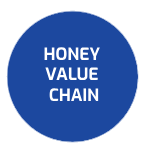
 National statistics indicate that almost 60% of the Eswatini population lives in poverty. Begun in 2022, the Honey Value Chain was designed to increase the productivity of subsistence farmers through the addition of honey farming. Experience to date highlights opportunities to computerize the honey farming management system, continue close coaching of individual farmers, improve marketing visibility and standards and create more purchasing capacity at individual farm gates, expediting the farmers getting paid directly.
National statistics indicate that almost 60% of the Eswatini population lives in poverty. Begun in 2022, the Honey Value Chain was designed to increase the productivity of subsistence farmers through the addition of honey farming. Experience to date highlights opportunities to computerize the honey farming management system, continue close coaching of individual farmers, improve marketing visibility and standards and create more purchasing capacity at individual farm gates, expediting the farmers getting paid directly.
The $20,000 PGAF award will be used to address the improvement opportunities identified above with the intent of strengthening the effectiveness & efficiency of the value chain supporting the current 600 base farmers and the 150 new farmers. These specific grant funds will be used for a batch code printer, a farmer database management system, farmer training, transportation costs and honey purchases.

 In Nceka Chiefdom, Eswatini, Mrs. Grace Mbonane is building a sustainable future through beekeeping. As a wife and mother of eight dependents, she manages an apiary alongside her thriving orchard of mango, avocado, and lemon trees, creating a stable livelihood for her family.
In Nceka Chiefdom, Eswatini, Mrs. Grace Mbonane is building a sustainable future through beekeeping. As a wife and mother of eight dependents, she manages an apiary alongside her thriving orchard of mango, avocado, and lemon trees, creating a stable livelihood for her family.
With support from Africa Works Swaziland (AWS) and a grant from P&G, Grace received training and two hives. Her bees play a vital role in pollinating her orchard, leading to increased fruit yields, while the trees provide pollen that enhances honey production. AWS not only supports her honey production but also ensures she has access to reliable markets, purchasing her honey and helping her generate a steady income. This allows her to afford essentials like food, clothing, and school fees for her children.
Beyond honey, Grace benefits from the flourishing orchard, producing high-quality fruit that she can sell locally. The combination of beekeeping and farming has created a cycle of growth and sustainability. Grateful for the opportunity, she reflects, “Beekeeping has increased my orchard’s yield, quality, and income.”
 Trust to Achieve Association
Trust to Achieve AssociationTrust to Achieve (TtA) Association’s mission is to empower visually impaired individuals and equip them for the workplace through a comprehensive program tailored to their career goals. This holistic approach encompasses career guidance, professional coaching, skill development, job application assistance, and networking opportunities.

Amaury Marchandise
20 years in CBD; Belgium, Malta, Geneva.
Amaury Marchandise and Thibault Trancart (a current P&G employee) play pivotal leadership roles. Since 2019, Amaury has served as the President of the Association, overseeing strategic development and partnership initiatives. Amaury's startup has successfully hired three Blind and Visually Impaired Persons (VIPs) for sales positions, serving as a tangible example for companies interested in recruiting VIPs. Amaury as well has secured partnerships with 10 companies (including P&G) and 2 foundations, providing crucial support for our programs.
Thibault Trancart, blind since the age of 14, is currently a Brand Manager at P&G and a valued member of our Board of Directors since 2019. He is responsible for member relations and has built a community of around fifty individuals, including VIPs and sighted professionals, fostering collaboration and support within Switzerland. His personal journey and advocacy efforts have inspired other VIPs to share their stories, resulting in positive change within the community.
In supporting his work, Amaury explains in his letter; “Five years ago, Trust to Achieve Association was founded by myself and six other Board members with the aim of bridging the integration gaps between VIPs and the professional realm. We firmly believe that VIPs represent an untapped talent pool, and fostering diversity and inclusion can drive organizational success when embraced effectively.”
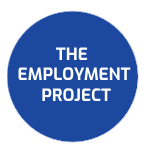
The project will build upon TtA’s past two years of professionalizing its tools and support processes, and embark on the next phase of developing its support services. This will take the form of 1) more individual support for 25 VIPs in addition to currently supported VIPs; 2) group coaching and training in a different format to promote economies of scale, and 3) involving a greater number of people/organizations: business coaches, mentors, relays in institutions, relays in companies, all of which will require greater coordination.
The goal of the project is to help 25 Visually Impaired People to pursue their dreams. The scope includes: 1) helping them put together an ambitious and viable career plan and portfolio; 2) teaching them how to present themselves and their competencies when interviewing and selecting opportunities (10 hours of professional coaching, peer to peer and professional mentoring 10 to 20 hours); 3) helping them acquire additional skills to be a competitive candidate (English, sector knowledge, specific resources: 10 to 60 hour course); 4) continuously monitoring and evaluating; 4) ensuring VIPs are thriving within the specific organization and position by learning the right skills, IT tools, and behaviors to navigate their environment (mentoring), and 5) following-up with the VIP and the team during the year following recruitment (start of employment, integration, career development) - 6 to 9 hours of support.

The PGAF grant of $15,000 will contribute to the coaching and mentoring of visually impaired individuals (VIPs) with team costs comprising a professional coach overseeing process validation and personalized support, a headhunter specializing in recruitment, an English teacher facilitating language proficiency enhancement, a project coordinator managing program logistics, board members actively involved in development strategy and a core of 7 volunteer mentors with extensive professional networks.

 Saliou's Journey: After receiving support from Trust to Achieve, Saliou secured his first job. Two years later, with newfound confidence and experience, he successfully pursued a new career opportunity in a company teaching other VIP's on assertive technologies.
Saliou's Journey: After receiving support from Trust to Achieve, Saliou secured his first job. Two years later, with newfound confidence and experience, he successfully pursued a new career opportunity in a company teaching other VIP's on assertive technologies.
Sacha's Transformation: Initially skeptical about his ability to work, Sacha underwent appropriate training and now serves as a client advisor in a supportive banking environment, thanks to Trust to Achieve's integration efforts.Thomas's Success: Despite losing his sight at a young age, Thomas, with tubular vision, found employment as a Brand Manager at Procter & Gamble, facilitated by Trust to Achieve's intervention. His internship quickly transitioned into full-time employment, showcasing the effectiveness of inclusive hiring practices.

 World Dance for Humanity
World Dance for Humanity
World Dance for Humanity (WD4H) bridges cultures and helps people in need by supporting small, sustainable, grassroots projects locally and in the developing world, and by providing immediate aid in response to disasters. All charitable donations and class proceeds go to underserved communities where a small amount of money can inspire hope and change lives, and where we can develop deep connections to the people served.

Betsy Stivers
21 years at P&G in Manufacturing and Product Supply; Cincinnati, New York, Long Beach.
Betsy became involved in WD4H eleven years ago, joined the Board in 2014 and became VP in 2015. She sponsors multiple students and has worked closely with the Rwandan-based Program Director and Business Coordinator to create a swift, efficient way of tracking the results for each locally created business. Despite many challenges and with Betsy’s guidance, nearly all of the existing businesses are reporting a small profit.
Betsy writes in her letter of recommendation, “I have enjoyed the opportunities the Foundation has given me to highlight the impact of PGAF grants to WD4H to your current and potential donors. PGAF’s generosity in funding ten of our businesses, improvement projects, and training/support through prior grants is making a significant difference in the lives of our 28 cooperatives.’
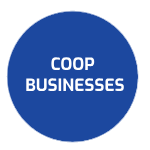
WD4H has funded 24 cooperative businesses, 10 of which were funded by previous PGAF grants. The businesses are managed collectively by the co-op and its leaders; the revenue generates a sustainable income that supports the entire community. They include a pig farm, a fish farm, several bakeries, a café, several sewing businesses and a brickmaking business among others. The businesses generate sustainable income that supports the entire community. 18 are currently generating profits: $12,035 (’22) and $18,918 (’23), a percentage of which go to each co-op member via yearly dividends. WD4H expects growth to continue through 2024 and 2025 thanks to the Business Training, oversight from the Business Coordinator, and the involvement of the emerging young co-op leaders, the Business Students funded by part of the grant (see below).

The PGAF grant will fund 3-day training event in 2025 attended by 80 representatives from each of the 28 cooperatives, fund for the year the cost of a Business Coordinator who helps manage the 24 supported businesses, and fund tuition/board expenses for 4 university students.


Odette endured unimaginable loss during the genocide, losing her husband, family members, and even her arm in the violence. Left alone to raise three children, she faced immense trauma and hardship, struggling daily just to survive.
Her turning point came when she joined the Abishyizehamwe Cooperative. Through the co-op, she found not only a source of income but also a path to healing and self-sufficiency. Today, she plays a vital role in its development and has transformed her life.
"As a widow and genocide survivor, I can truly say that this cooperative saved my life. I once wandered from house to house begging for food, but now I share what I have with those in need. With the dividends from our P&G Alumni Foundation-funded business, I achieved what once felt impossible—I bought land and even a prosthesis for my lost arm.
I am no longer just surviving; I am thriving. Thanks to the support we received, I now belong to a community that provides for others. Comparing my past to my present, I am filled with gratitude for everyone who made this possible. I pray for endless blessings upon you all!"
 ZYL Rare Diseases Caring Center
ZYL Rare Diseases Caring CenterZYL Rare Diseases Caring Center is devoted to making a real social impact for rare diseases patients in local communities in three focus areas: vocational training (education), confidence building (mental health promotion) and business development. It envisions a society where every rare disease patient is empowered to get proper employment.


Cheryl Gui
P&G Alumni Grant ChampionCheryl Gui
20 years in Brand Management/Executive Management in Guangzhou.
Cheryl has been involved with ZYL for 10 years. Since 2021, Cheryl has been on the Board and more recently has become the Honorary Vice Chair. She wears a number of hats that include program development and coordination, young volunteers training, logistics management, and grant writing. Cheryl has helped ZYL Caring Center’s fund-raising activities and secured over US$5000, and like-kind donations of US$1000. She has organized 200+ volunteers to help the Rare Diseases Group.
In January of this year and as one of the key leaders of the ZYL Public Welfare Communication Performance Services Program, Cheryl successfully planned and organized the Disabled Persons/Healthy People performance show that included the ‘Spark Choir’ group of disabled singers. It was held in the very busy Metro (rail) station in Guangzhou. The aim of the show was to help connect the disabled and the healthy, building public awareness of the skills and capacities of those who are disabled while giving them a confidence boost .
In her support memo Cheryl writes: “I have been involved with ZYL since 2014. The more I learned about ZYL’s programs, their donors, and their self-sustaining model, the more I wanted to do more for this special magic group. Their hard work in fighting for those with rare diseases and their efforts to change pessimistic thinking to happiness has always touched me a lot. ZYL is a magic team.”
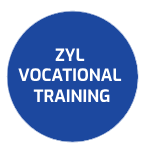
In 2020, the ZYL Caring Center launched a professional Digital Marketing studio with associated video and sound recording hardware/software capacity. This initiative offers rare disease patients and disabled persons the opportunity to learn the vocational skills associated with recording hardware and software, shooting, digital marketing skills, etc. Over a 12 month period, ZYL will conduct 12 training sessions (each lasting 5 days), and organize at least one or two monthly music video/music development activities with 1-to-1 tutoring onsite. The program will also include practical internship opportunities for trainees in real public welfare work projects, as well as mentoring and networking opportunities for participants.

The PGAF grant of $13,000 will contribute to the training of as many as 150 disabled persons/rare diseases patients, and impact as many as 1000-5000 family/community members via its on-line presence. Grant funds will pay for trainers who facilitate the workshops and training sessions, specialists who oversee the training programs with disabled persons, Internship expenses, logistics expenses, and related media production material expenses.

Xian, a 28 year old hemophiliac who is permanently disabled and unable to walk, taught himself. the basic skills of video production at home. Seeking more opportunities, he applied to the ZYL training held in Nov. 2021. After spending about a year in the program, during which he occasionally took on some flexible low-pay work, Xian finally mastered all the professional skills needed for digital marketing and documentary film production. Once finished, ZYL helped him find work in Digital Marketing/documentary film production at a public welfare organization where he now earns RMB3000(US$415) per month, enabling him to live independently.
Procter & Gamble and P&G are trade names of The Procter & Gamble Company and are used pursuant to an agreement with The Procter & Gamble Company. P&G Alumni Network is an independent organization apart from The Procter & Gamble Company.
(P&G Alumni Foundation is a part of the P&G Alumni Network).
